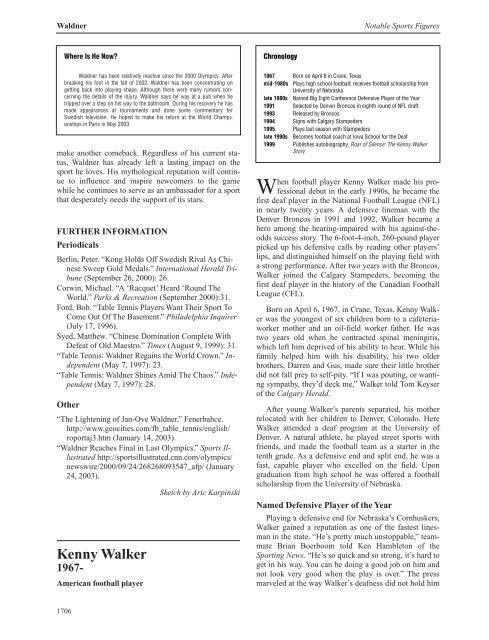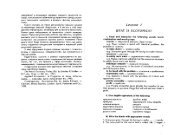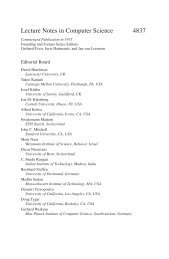Frank Thomas
Frank Thomas
Frank Thomas
You also want an ePaper? Increase the reach of your titles
YUMPU automatically turns print PDFs into web optimized ePapers that Google loves.
Waldner Notable Sports Figures<br />
Where Is He Now?<br />
Waldner has been relatively inactive since the 2000 Olympics. After<br />
breaking his foot in the fall of 2002, Waldner has been concentrating on<br />
getting back into playing shape. Although there were many rumors concerning<br />
the details of the injury, Waldner says he was at a pub when he<br />
tripped over a step on his way to the bathroom. During his recovery he has<br />
made appearances at tournaments and done some commentary for<br />
Swedish television. He hoped to make his return at the World Championships<br />
in Paris in May 2003.<br />
make another comeback. Regardless of his current status,<br />
Waldner has already left a lasting impact on the<br />
sport he loves. His mythological reputation will continue<br />
to influence and inspire newcomers to the game<br />
while he continues to serve as an ambassador for a sport<br />
that desperately needs the support of its stars.<br />
FURTHER INFORMATION<br />
Periodicals<br />
Berlin, Peter. “Kong Holds Off Swedish Rival As Chinese<br />
Sweep Gold Medals.” International Herald Tribune<br />
(September 26, 2000): 26.<br />
Corwin, Michael. “A ‘Racquet’ Heard ‘Round The<br />
World.” Parks & Recreation (September 2000):31.<br />
Ford, Bob. “Table Tennis Players Want Their Sport To<br />
Come Out Of The Basement.” Philadelphia Inquirer<br />
(July 17, 1996).<br />
Syed, Matthew. “Chinese Domination Complete With<br />
Defeat of Old Maestro.” Times (August 9, 1999): 31.<br />
“Table Tennis: Waldner Regains the World Crown.” Independent<br />
(May 7, 1997): 23.<br />
“Table Tennis: Waldner Shines Amid The Chaos.” Independent<br />
(May 7, 1997): 28.<br />
Other<br />
“The Lightening of Jan-Ove Waldner.” Fenerbahce.<br />
http://www.geocities.com/fb_table_tennis/english/<br />
roportaj3.htm (January 14, 2003).<br />
“Waldner Reaches Final in Last Olympics.” Sports Illustrated<br />
http://sportsillustrated.cnn.com/olympics/<br />
newswire/2000/09/24/268268093547_afp/ (January<br />
24, 2003).<br />
Kenny Walker<br />
1967-<br />
American football player<br />
1706<br />
Sketch by Aric Karpinski<br />
Chronology<br />
1967 Born on April 6 in Crane, Texas<br />
mid-1980s Plays high school football; receives football scholarship from<br />
University of Nebraska<br />
late 1980s Named Big Eight Conference Defensive Player of the Year<br />
1991 Selected by Denver Broncos in eighth round of NFL draft<br />
1993 Released by Broncos<br />
1994 Signs with Calgary Stampeders<br />
1995 Plays last season with Stampeders<br />
late 1990s Becomes football coach at Iowa School for the Deaf<br />
1999 Publishes autobiography, Roar of Silence: The Kenny Walker<br />
Story<br />
When football player Kenny Walker made his professional<br />
debut in the early 1990s, he became the<br />
first deaf player in the National Football League (NFL)<br />
in nearly twenty years. A defensive lineman with the<br />
Denver Broncos in 1991 and 1992, Walker became a<br />
hero among the hearing-impaired with his against-theodds<br />
success story. The 6-foot-4-inch, 260-pound player<br />
picked up his defensive calls by reading other players’<br />
lips, and distinguished himself on the playing field with<br />
a strong performance. After two years with the Broncos,<br />
Walker joined the Calgary Stampeders, becoming the<br />
first deaf player in the history of the Canadian Football<br />
League (CFL).<br />
Born on April 6, 1967, in Crane, Texas, Kenny Walker<br />
was the youngest of six children born to a cafeteriaworker<br />
mother and an oil-field worker father. He was<br />
two years old when he contracted spinal meningitis,<br />
which left him deprived of his ability to hear. While his<br />
family helped him with his disability, his two older<br />
brothers, Darren and Gus, made sure their little brother<br />
did not fall prey to self-pity. “If I was pouting, or wanting<br />
sympathy, they’d deck me,” Walker told Tom Keyser<br />
of the Calgary Herald.<br />
After young Walker’s parents separated, his mother<br />
relocated with her children to Denver, Colorado. Here<br />
Walker attended a deaf program at the University of<br />
Denver. A natural athlete, he played street sports with<br />
friends, and made the football team as a starter in the<br />
tenth grade. As a defensive end and split end, he was a<br />
fast, capable player who excelled on the field. Upon<br />
graduation from high school he was offered a football<br />
scholarship from the University of Nebraska.<br />
Named Defensive Player of the Year<br />
Playing a defensive end for Nebraska’s Cornhuskers,<br />
Walker gained a reputation as one of the fastest linesman<br />
in the state. “He’s pretty much unstoppable,” teammate<br />
Brian Boerboom told Ken Hambleton of the<br />
Sporting News. “He’s so quick and so strong, it’s hard to<br />
get in his way. You can be doing a good job on him and<br />
not look very good when the play is over.” The press<br />
marveled at the way Walker’s deafness did not hold him

















